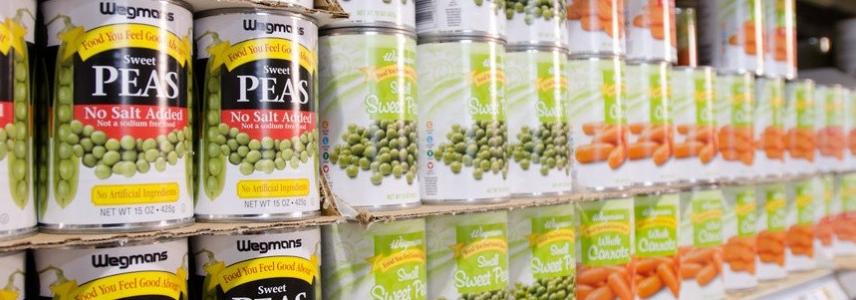High demand for processed fruit and vegetables due to COVID-19

The recent outbreak of the coronavirus has greatly affected people’s behaviour. On the demand side, people are stockpiling shelf-stable food, like processed fruit and vegetables. On the supply side, companies are struggling to meet this demand due to labour and logistics capacity issues.
Stockpiling canned and frozen fruit and vegetables
One of the first reactions across Europe was the fear of scarcity. People started to buy huge amounts of shelf‑stable and processed food. This panic buying has positively affected the demand for canned beans, fruit and vegetables. All canneries around the world have large orders for smaller retail can sizes. But, the demand for bigger cans (5-15 kg) for the foodservice sector has decreased due to the closures of restaurants. Producers of fresh products have had many order cancellations, forcing them to redirect products to processing.
Fruit juice sales have also increased. The majority of bottling companies are focusing on the production of orange and apple juice, as exotic ingredients are hard to source. From an importers point of view, major ingredients, such as frozen concentrated orange juice were also being ‘panic bought’. Frozen berries were also in higher demand (and had higher prices as a result) because of the idea that they strengthen the immune system.
Labour force shortage
In several major producing areas, labour is not available. Limitation of movement is one of the main reasons, but also fear of infection by workers. For example, in the Philippines, people are locked in their houses. This has stopped the production and delivery of desiccated coconut and dehydrated bananas.
Thailand is another example. There, companies harvested pineapples earlier than usual due to fears that they would not have enough workers. This resulted in lower quality products. In India, due to lack of buses and trains, workers cannot travel and harvest yields. Also, India cannot process (imported) cashew nuts due to the foreign border closure. This is already resulting in a price increase.
Supply chain issues
The logistics sector reported problems in finding enough truck drivers, the restrictions on sea transporters and a lack of air freight Ocean freight is facing a shortage of containers, which is a major problem for exporters from developing countries. Also, in Europe, there are transport delays. Internal border controls can cause long waiting times of up to 18 hours. To ease food supply, the European Food Safety Authority is about to introduce alternative checks. For example, they may accept digital copies of documents and have meetings online or on the phone.
Stay informed on COVID-19 updates
Would you like detailed information on the effect of COVID-19 on a regular basis? Take a look at these websites:
- IHS Markit Coronavirus (COVID-19) Resource Centre provides the latest insights and special reports on the impact of the coronavirus for many topics. These include natural resources, food trade, maritime, transportation and financial services.
- Food Navigator is one of the leading news sources for the food industry and market in Europe. Read regular updates on the impact COVID-19 has on food business, trends, consumer behaviours and company responses to the crisis.
- Food and Agricultural Organisation of the United Nations (FAO) has assessed the risks and impact of COVID-19 on the global supply chain. FAO has expressed great concern for countries already affected by high levels of food insecurity.
- European Trade Association for Dried Fruit, Edible Nuts and Processed Fruit and Vegetables (FRUCOM) publishes all relevant European COVID-19 regulations for the trade of edible nuts and dried fruit.
- Tridge is a global sourcing hub has created reports on the influence of the l coronavirus on agricultural markets. See updates on border restrictions, logistics, regulations, influences on import and export, and domestic supply and demand. On Tridge, you can also monitor the impact of COVID-19 on the prices of a wide range of processed fruit and vegetable products.
- Nielsen is one of the largest global marketing research companies. It tracks consumer behaviour changes caused by COVID-19 around the world. Understanding behavioural changes can help developing country exporters to Europe prepare for the future.
- IRI is a global marketing research company. It monitors the influence of the coronavirus pandemic on international business and retail sales.
- Rabobank (RaboResearch) publishes regular expert analysis and opinion pieces. Read about the impact of COVID-19 on food and agri-business sectors in the Netherlands and Europe. Also, stay informed by listening to podcasts about the impact of the coronavirus on food retail, food service and packed food.
- Euromonitor has a special blog related to COVID-19. Read their regular updates on weekly prices and availability insights.
- MAERSK is one of the leading shipping companies. It has published a report giving advice on how to maintain the supply chain and minimise the impact on your business in cases of crisis.
- Port of Rotterdam provides regular updates on the affect coronavirus has on cargo handling at the largest European port.
- International Monetary Fund provides daily updates for each country regarding key policy responses on COVID‑19.
- Must-know country-specific sources that are not to be missed include Ismea (Italy), Kantar (mostly UK), and the African Cashew Alliance.
This news article has been written for CBI by Autentika Global.
Stay informed
To stay informed on the latest developments in Processed Fruits, Vegetables and Edible Nuts, make sure to subscribe to our newsletter.